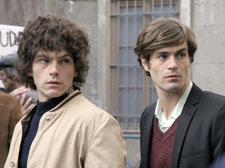|
|
 |
| |

Yann Trégouët as Herve and Yannick Renier as Yves in Born in 68 |
French connections are broken in rebel odyssey
BORN IN 68
Directed by Olivier Ducastel and Jacques Martineau
Certificate 18
THE personal and collective past is the grand theme running through this meandering tale.
Spanning 40 years and two generations, it starts with the Parisian riots of 1968 and follows a group of idealistic students as they gently age and are forced to consider the point of holding strong political beliefs.
We meet Catherine (Laetitia Casta) as she and her friends Yves and Herve man the barricades. Idealistic, in love, and with a world to explore, they sum up the hopes of a generation.
But as the state cracks down and the students gain little more than bumps on the head, the trio gather other like-minded rebels and set up a commune in the beautiful French countryside.
We watch as they pursue free love, share the work and get high. It is all rather entertaining stuff, but gradually personal wishes and needs begin to consume those living there and slowly but surely people drop out of being dropouts.
An issue arises amongst the commune members as to whether their behaviour – setting up a community in which everyone is equal, there is no male domination or pre-defined roles – is selfish and inward looking, or a template for the rest of the world to follow.
Friends of mine who have left London to live in a tumbledown stately home in Scotland and live a communal life believe they are in some way showing the rest of us how simple and groovy it can be. They are all of progressive political persuasions, and their home is a testimony to shared living and their many talents. Yet every time I go and stay with them I feel slightly sick – it’s not that they are doing anything wrong, and their organic veggie patch makes me salivate, it’s just that this bunch of people have been blessed with being born into middle class backgrounds with all their attendant trappings, are incredibly talented, but amazingly selfish. They should not be cosying themselves away because the rest of the world is not to their taste. They should be right in the midst of it all, using their education and training and silver-spooned backgrounds to make the world a better place for all.
This is the crux of much of this film. As the do-gooding Parisian rebels start doing up their farmhouse, frolicking naked through the meadows and generally having a share and share alike knees up, there is zilch class solidarity going on.
The film meanders through the 1968 to 81 period, carefully chronicling the personal and national politics of the time, and then the story’s baton is passed on to the generation of children born in the farmhouse.
We meet Catherine and Yves’s son Boris and daughter Ludmilla, and their story is used to show how much the world has changed in just a generation.
This film is rather long, but while that could lead to fidgeting, its leading players are incredibly watchable. Casta and Yannick Renier, who plays Yves, are utterly gorgeous together on screen, and the way the story unfolds is gently compelling, under-played, full of integrity and well-meaning. |
 |
|
 |
| |
|
 |
|

